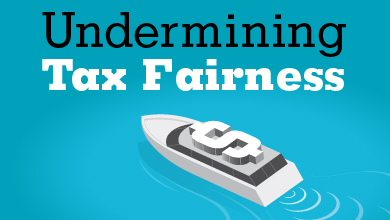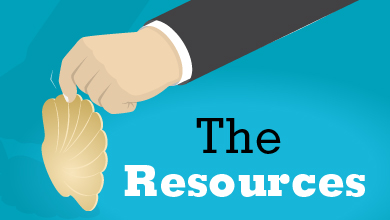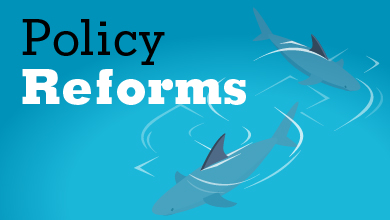3. Policy Reforms
A fair tax system is essential to a healthy economy – one that not only can grow but also improve the lives of Canadians. Unfortunately, Canada hasn’t made much progress in this direction in recent decades. Instead, it has experienced only modest economic growth combined with rapidly increasing inequality and meagre outcomes for average Canadians. Over the last 40 years, most of the benefits of economic growth have gone to the wealthiest among us. Between 1982 and 2010 the real market income of the richest 10% of tax filers grew by 75% while the other 90% saw their income grow by only 2%.[1]
Of course the tax system alone isn’t responsible for this troubling trend. But an efficient tax system can be both an economic engine and a social equalizer, a tool to pool resources and fund public services – e.g., education, health care, old age security – that benefit everyone. At the same time, such services help provide employers with a capable, healthy, productive work force and allow entrepreneurs to assume risks by providing them with necessary protections.
In February, 2018, the Professional Institute of the Public Service of Canada (PIPSC) conducted a survey of the entire population of professional staff at the Canada Revenue Agency (CRA), including auditors, managers, forensic accountants, economists, statisticians, and actuaries. The purpose of the survey was to gather input on a variety of issues that affect the work lives of PIPSC members. However, the findings go far beyond the CRA workplace. These responses by thousands of tax professionals with special knowledge of the inner workings of the Canada Revenue Agency provide a unique opportunity to see how front-line employees define tax fairness and expose some key weaknesses of the Canadian tax system that need to be corrected.[2]
In the first two reports based on this survey, we examined the threats posed to tax fairness by offshore tax havens and loopholes, as well as the challenges to Agency resources prompted by the former Harper government’s budget cuts. In this third and final report, we examine some broader policy options that, in the opinion of CRA professionals (and, in one instance, Canadians), should be pursued to make our tax system fairer.
Level the e-commerce playing field
A serious policy imbalance currently exists within the tax system that favours global e-commerce giants such as Facebook, Apple, Amazon, Netflix and Google, the so-called FAANG group, over Canadian companies. For example, Netflix is not required to submit sales tax on transactions that occur in Canada, while similar Canadian-based streaming services don’t enjoy the same privilege.
In addition, while companies such as Google and Facebook, are among the most profitable in the world, and do a significant portion of business within Canadian borders, they aren’t taxed nearly enough for the corporate profits generated within Canada. In many instances they aren’t taxed at all.[3]
Moreover, the Income Tax Act was modified a generation ago to provide incentives to Canadian companies that advertise using Canadian publications and broadcasters. In recent years, advertising revenue among traditional Canadian media has decreased by as much as 50% while advertising revenue among companies such as Google and Facebook has skyrocketed. These two companies alone now receive almost 25 cents of every Canadian advertising dollar. [4] At the moment, these companies get the same treatment as Canadian media outlets without adding cultural value and local media jobs in the same way that local companies do.
It’s easy to see why this unfairness needs to be addressed.
And Canadians agree.
When asked recently if “E-commerce companies such as Netflix, Google, Amazon and Uber, should be subject to Canadian taxes for business carried out in Canada,” almost 8 out of 10 Canadians (77%) agreed, more than half of them (54%) strongly.[5] Professionals at the CRA went further, with almost 9 out of 10 (87%) agreeing and almost 7 out of 10 (67%) strongly agreeing.
Ownership must be transparent
As investigations into offshore tax havens have made clear, big-time tax evaders rely on secrecy. One way they do so is through “beneficial ownership” of a property, asset or corporation. Beneficial ownership differs from legal ownership. While on paper business entities require a legal owner, in many cases additional entities can exist with the ability to influence control over the legal owner and disproportionately reap rewards. For example, a shell company may be set up with a legal owner for the explicit purpose of helping another company evade taxes.
This isn’t a hypothetical scenario. The Panama Papers revealed that such transactions happen all the time. Canada’s relaxed secrecy laws were shown to be particularly susceptible to this type of abuse, referred to as “snow washing”.[6] The reports revealed how companies were advised to set up shell companies in Canada and use them as conduits to flow revenue generated in one country to a tax haven in another. The companies in question would then end up evading taxes in both Canada and the country where the revenue was generated.
Where secrecy is the problem, transparency is the solution. Almost two thirds (61%) of CRA professionals surveyed believe Canada is too secretive about beneficial ownership information and over 7 out of 10 (75%) believe that federal and provincial governments should require corporations to publicly identify "beneficial ownership" relationships. The Canadian government has recently taken steps to address the problem, but much more needs to be done.
Just because it’s legal, doesn’t mean it’s fair
While some who dodge taxes know they are breaking the law, others offend the spirit of the law while striving always (if barely) to observe the letter of it. Companies that do business in a country and benefit from ongoing public investments in infrastructure, education and other services should always be taxed according to the amount of business they do in that country.
But technological advancements, combined with an increasingly complicated commercial landscape, have put nation states at a distinct disadvantage. Government power is limited by its own borders. Conversely, multinational corporations can now take advantage of multiple borders and virtual commercial spaces to look for arrangements that best suit their own purposes.
“Profit shifting” is a perfect example. A company that operates in numerous countries around the world has control over its internal supply chain. National governments collect corporate taxes based on a company’s profits. As a consequence, multinational corporations are encouraged to make strategic decisions about where to allocate profits in order to minimize their tax bills. This isn’t about two countries competing for jobs and expecting a corresponding amount of tax revenue; it’s about companies not wanting to pay any tax anywhere.
Canada has taken active steps towards combating this type of behaviour by joining the group of 124 nations currently implementing the Organisation for Economic Cooperation and Development’s “Base Erosion and Profit Shifting Action Plan” (BEPS). A major component of this initiative is to compel multinational companies to disclose information about what types of business they conduct and where.
CRA professionals are in step with this initiative: 80% agree it would reduce tax avoidance and evasion if multinational corporations were required to disclose information such as revenue, profit and taxes paid for each tax jurisdiction in which they operate.
By advocating for country-by-country reporting, BEPS represents a significant step forward. But it doesn’t go nearly far enough. The initiative is designed to be conservative and advance slowly. Yet there are some logical next steps that could easily be taken immediately.
For example, the fact that companies are allowed to book profits in regions where no economic activity occurs is flawed and legitimizes aggressive tax avoidance. Over 8 out of 10 CRA professionals (83%) believe that corporate subsidiaries located in tax havens should not qualify as separate entities for tax purposes if they cannot demonstrate "economic substance" (i.e., meaningful operations carried out in the region beyond gains achieved from favourable tax treatment). Similarly, over two-thirds (71%) of CRA professionals believe that Canadian rules related to setting up offshore corporations or tax accounts are too lenient and should be reformed.
An alternative approach involves reducing the impact of subsidiaries in tax havens by applying taxes regardless of where profits are booked. This might see the federal government impose a tax directly on any Canadian assets held in tax havens. Seven out of 10 CRA professionals (73%) agree this would be worthwhile.
Another questionable method corporations use to get around taxes is to make strategic loans within their own supply chains in order to take advantage of different tax incentives offered in different countries. Almost 7 out of 10 tax professionals (68%) agree that the federal government should cap the amount of interest payments to offshore subsidiaries that corporations can deduct for tax purposes.
Restore balance to the tax system
Canadians are fed up with the shell game, and tax professionals at the CRA are firmly among them. Wealthy individuals and multinational corporations have managed to game the system for far too long. The time has come to tilt the scale once more in favour of the middle-class.
With enhanced transparency, international cooperation and political will, there are numerous ways that governments can end these destructive practices. CRA professionals are among the most knowledgeable tax experts in the world and they are putting forward a series of practical recommendations in response to the problems described in this report.
- Tax e-commerce companies fairly: Close the tax loophole for advertising on foreign internet platforms and ensure sales taxes and corporate taxes are deducted for online sales and relevant economic activity that occur in Canada.
- Create a publicly accessible “beneficial ownership” registry: Over the past year, major steps have been taken to curb illegal behaviour by enhancing transparency related to beneficial ownership. In addition to what’s already been done, the government needs to create a one-stop, easy-to-use tool that enhances, standardizes and aggregates information from all federal and provincial jurisdictions.
- End “profit shifting” now: The OECD BEPS action plan does not go far enough. There are a variety of additional actions that must be taken to eliminate this harmful practice immediately. The range of options begins with forcing companies to prove “economic substance” and ends with a version of unitary taxation of multinational corporations. The OECD and the European Union have recently shown a willingness to move in this direction, using a tax formula based on the amount of economic activity carried out in each country. The result would be a new, simplified view of the global commercial landscape – one in which corporations can be prevented from pitting countries against each other and are taxed fairly everywhere.
[1] Income Inequality in Canada: Driving Forces, Outcomes and Policy, David A. Green, W. Craig Riddell and France St-Hilaire. Institute for Research on Public Policy, February 2017. p. 9.
[2] Invitations to complete the Professional Integrity, Workplace Satisfaction and Tax Fairness Survey were sent to 11,599 members of the Audit, Financial and Scientific Group (AFS) at the Canada Revenue Agency between February 20 and March 6, 2018. Of those who were invited, 2,170 respondents completed the survey (18.7%).
[3] Canadian Taxes Don't Apply To Companies Like Google, And We Pay With Jobs, Dennis Howlett, Huffington Post, November 29, 2017. https://www.huffingtonpost.ca/dennis-howlett/canadian-taxes-dont-apply-to-companies-like-google-and-we-pay-with-jobs_a_23291061/
[4] Close the Loophole! The Deductibility of Foreign Internet Advertising, Peter Miller & David Keeble, Friends of Canadian Broadcasting, March 2018. https://friends.ca/explore/article/close-the-loophole-the-deductibility-of-foreign-internet-advertising/
[5] The public opinion survey by Environics Research (commissioned by PIPSC) was conducted by telephone among 1,000 Canadians between July 3 and 8, 2018. The results can be considered accurate + or – 3.2%, 19 times out of 20.
[6] ’Tax haven’ Canada being used by offshore cheats, Panama Papers show, Dave Seglins, Rachel Houlihan, Zach Dubinsky, CBC News, January 24, 2017. https://www.cbc.ca/news/investigates/panama-papers-canada-tax-haven-1.3950552





